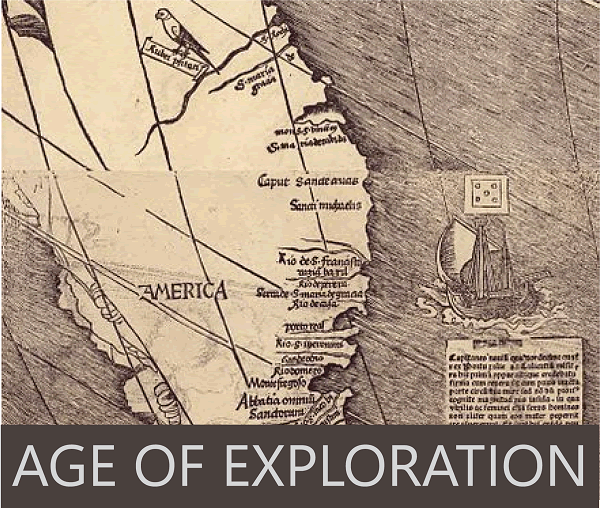 |
Age of Exploration Educational Materials |
|---|
| www.studenthandouts.com > World History > Age of Exploration |
|
The Age of Exploration, also known as the Age of Discovery, was a period of global history that spanned from the late 15th century to the early 17th century. It was characterized by extensive maritime exploration, trade, and colonization by European powers. This era had a profound impact on world history, reshaping global trade routes, cultures, and societies.
Motivations: Several factors drove the Age of Exploration. These included a desire to find new trade routes to Asia, bypassing the Ottoman Empire's control of traditional overland routes; the pursuit of wealth through the acquisition of valuable resources, particularly spices; and a desire for religious conversion and missionary work. Technological Advances: Advances in shipbuilding, navigation, and cartography played a pivotal role in enabling exploration. The development of the caravel, a smaller, highly maneuverable ship, and the astrolabe and quadrant for navigation were crucial innovations. Portuguese Explorations: Portugal was a pioneering nation in the Age of Exploration. Prince Henry the Navigator sponsored voyages along the west coast of Africa, eventually reaching as far as the southern tip of the continent. This laid the groundwork for future exploration. Christopher Columbus: In 1492, Christopher Columbus, an Italian explorer sailing under the Spanish flag, embarked on a voyage to find a westward route to Asia. Instead, he reached the islands of the Caribbean, initiating European contact with the Americas. Vasco da Gama: Portuguese explorer Vasco da Gama reached the shores of India in 1498, establishing a sea route to Asia. This opened up lucrative trade in spices and other valuable commodities. Spanish Conquest: Spanish explorers, including Hernán Cortés and Francisco Pizarro, ventured to the Americas and initiated the conquest of vast empires such as the Aztec and Inca. This led to the colonization of the Americas by Spain. Treaty of Tordesillas: To avoid conflicts between Spain and Portugal over newly discovered territories, the Treaty of Tordesillas (1494) was signed, dividing the non-European world into two spheres of influence. Spain gained most of the Americas, while Portugal claimed Africa, India, and Brazil. Circumnavigation: In 1519, Ferdinand Magellan's expedition became the first to circumnavigate the globe, proving the Earth's spherical shape. Magellan himself did not survive the journey, but his fleet continued to sail westward and eventually returned to Spain. Establishment of Maritime Empires: European powers, including Portugal, Spain, England, France, and the Netherlands, established maritime empires by establishing colonies and trading posts in Africa, Asia, and the Americas. Exchange of Goods and Cultures: The Age of Exploration led to the Columbian Exchange, a massive exchange of plants, animals, cultures, technologies, and diseases between the Old World (Europe, Asia, and Africa) and the New World (the Americas). This exchange had profound consequences for both hemispheres. Impact on Indigenous Peoples: The arrival of Europeans had devastating consequences for indigenous peoples in the Americas, including the spread of diseases, forced labor, and cultural disruption. In many cases, indigenous populations experienced significant declines. Legacy: The Age of Exploration fundamentally altered the course of world history, reshaping global trade, cultures, and societies. It laid the foundation for modern colonialism, the development of new trade routes, and the integration of previously isolated regions into a more interconnected world. Despite its significant contributions to knowledge, technology, and global interactions, the Age of Exploration also brought about exploitation, colonization, and cultural clashes. It remains a complex and debated period in world history, with both positive and negative legacies that continue to influence our modern world. |
| www.studenthandouts.com > World History > Age of Exploration |







